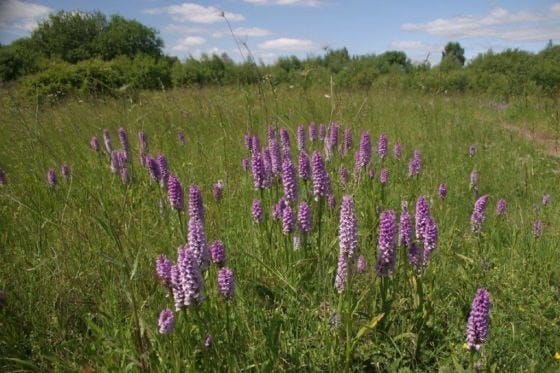Welcome to Just Two Things, which I try to write daily, five days a week. Some links may also appear on my blog from time to time. Links to the main articles are in cross-heads as well as the story.
(Image of Canvey Wick Nature Reserve by Chris Gibson Wildlife)
By abandoned, I mean abandoned by humans. The writer Cal Newport has just published a book on this theme, and she turned up on the Prospect podcast to talk about it (36 minutes). The book, in short, is about places that were once used by humans, and aren’t any more—from the byngs in the Scottish Lothians, where she lives, to disused sites on Canvey Island, to Chernobyl’s exclusion zone, to New Jersey’s former industrial areas, to Montserrat, destroyed by a volcano. The book was researched before lockdown and finished during it.
Apparently once you start noticing such abandoned spaces, you start seeing them everywhere.
The podcast is full of interesting things—“seed rain”, for example, is one of the processes by which spaces abandoned by humans are recolonised by other species, and I didn’t know that the one-time Canvey Island gasworks (photo above) is the first site in England to be protected because of the richness of the insect life it harbours.
When she says “abandoned”, she doesn’t mean they are completely abandoned by humans. People have returned to live in the Chernobly exclusion zone, although the wolves are more of a problem that they used to be. The homeless people now living in New Jersey’s decaying industrial buildings are living “literally in the wreckage of capitalism.”
She’s impatient with the strain of eco-activists who took the pandemic as a sign that “we are the virus”. Although the weight of people on the planet—literally and metaphorically—is excessive, she points out that many species are now intertwined with humans. The Japanese deer that picturesquely left their park during lockdown were looking for food, because the people who used to feed them were no longer visiting.
The interview brought to mind Alan Weisman’s 2007 book The World Without Us, which describes how other species would recolonise the world if humans suddenly left.
Cal Flyn also has a Five Books interview on, well, five books about abandoned places.
The Anglo-American-Indian poet Bhanu Kapil won the T.S.Eliot poetry prize last week for her collection How To Wash A Heart. The prize is the most prestigious in the UK and the shortlist (pdf) is a good guide to the state of poetry in any given year.
Kapil’s book—in five eight-poem sequences, with no individually titled poems—reads as a kind of stream of consciousness, which is perhaps fitting after a year when days flowed into each other without much to distinguish them. Devina Shah reviewed the book for the website Poetry School:
As a British Indian who has recently returned to England after many years residing in North America, Kapil’s poetic investigation of the host-guest bond is nuanced and incisive, taking into consideration history, microaggressions, conditional love, and creative compromise.
The collection has a medley of inspirations, outlined in the ‘Note on the Title’ at the back of the book. One of these is a photograph in a newspaper of a couple in Berkeley, California ‘who had opened their home to a guest with a precarious visa status.’ What catches her attention is how they are smiling, how ‘the soft tissue contraction’ of the mouth muscles is ‘at odds (when visible) to a smile itself.’ For Kapil, the image connected to the oddness of the experience of being a guest in someone else’s home. As a guest, you are welcomed into the home and life of your host, while simultaneously welcoming the host into your own life.
There’s an interview with Bhanu Kapil about the book at Indian Express, and the Poetry Foundation has some extraordinary poems by her from an earlier collection. BBC Radio 3’s The Verb devoted a programme to the short-listed poets, with some fine readings.
j2t#025
If you are enjoying Just Two Things, please do send it on to a friend or colleague.




